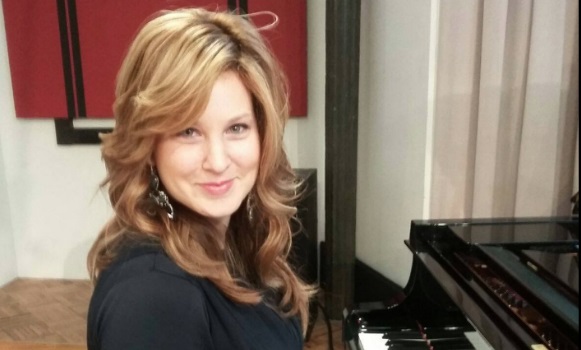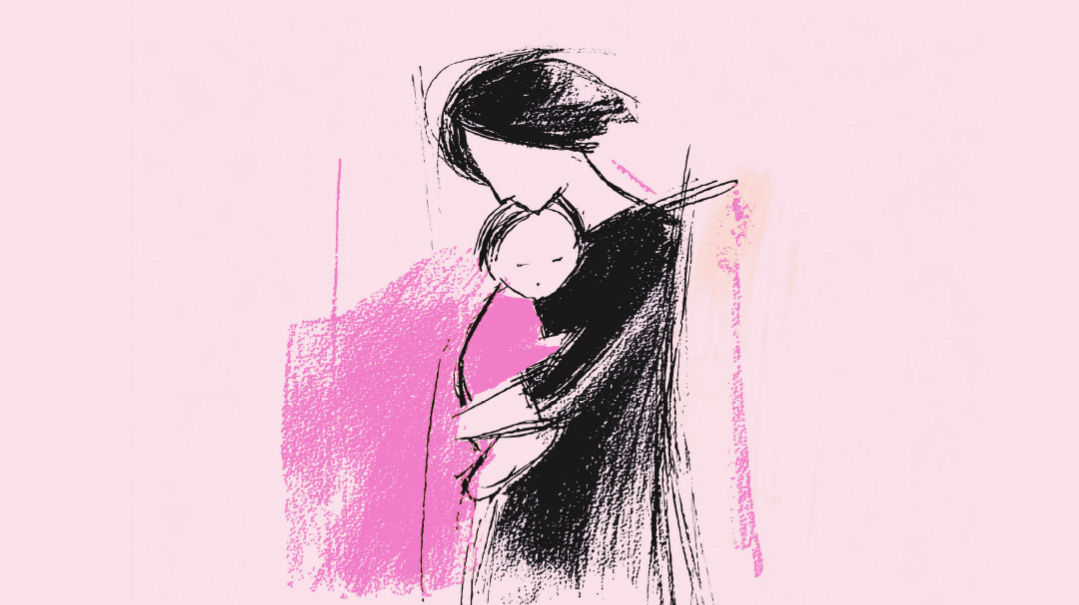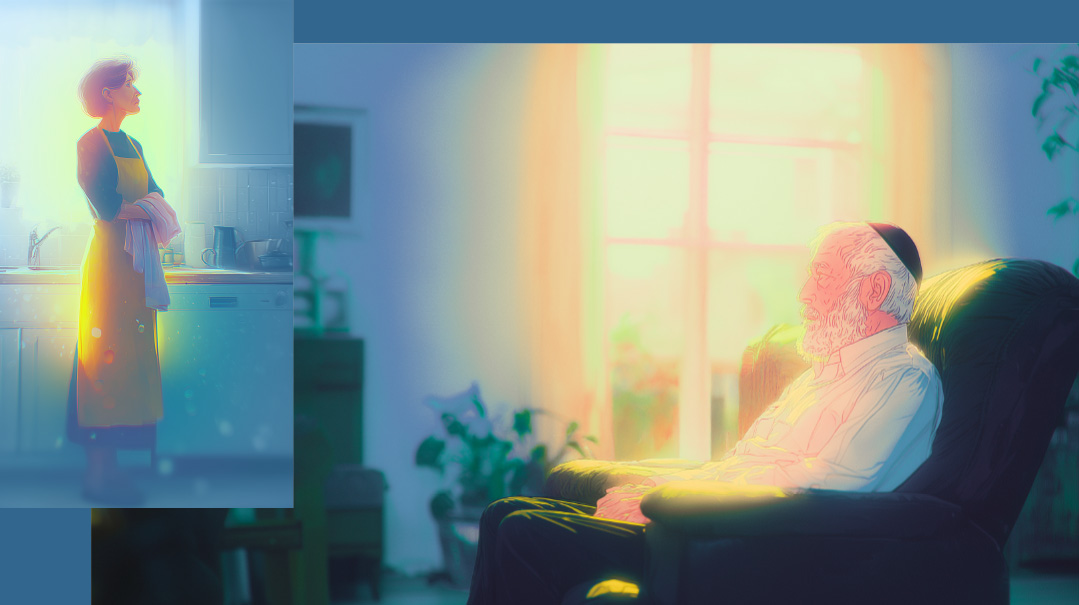Song of Triumph
| December 9, 2020Through her husband’s battle for his life, composer Sarah Dukes sings of faith and courage

Sarah Dukes was just eight years old when she composed her first melody, “Elephant in Tights.” Today she’s an award-winning composer whose record of piano melodies was on the ballot for the 59th Grammy Awards. And it all started when she didn’t want to practice piano.
“My parents told me that I still needed to sit at the piano every day, even if I didn’t want to play. I was bored and started fooling around with the keys. That’s when I realized I could create my own melodies instead of the ones the piano teacher gave me.
But it’s not like I hear complete melodies in my head,” she explains about her composing process. “I feel a strong pull of emotion and know something needs to come out, so I go and sit at the piano and play around until I find it. I start putting things together until I realize, ‘Oh, there it is.’ ”
Because every song she composes comes straight from her heart, Sarah considers the piano to be her diary. It took her years to release her first album, Finding Forever, a collection of songs she wrote in high school, because they felt so personal. Publicizing them made Sarah feel vulnerable.
She eventually did release them, having top-talent pianists play the melodies on the recording. Why use others? “I consider myself more of a composer than a pianist,” she says. “I compose songs that are more complex than what I myself can play.”
Her most recent release, “Triumph,” was in October, but Sarah actually composed it years before. Three years ago, her daughter had respiratory syncytial virus (RSV), a dangerous virus that affects toddlers. At just one-and-a-half years old, the Dukes’ daughter was intubated.
“During her long recovery, I started writing this piece, reflecting on how she pulled through the scary time. It made me think of what we went through as a family and how we were all triumphant. Then I thought about how everyone is going through something and we’re all triumphant in our own ways by doing the best we can. The melody turned into a piece acknowledging the power within all of us.”
Because the song felt so powerful, Sarah wanted a full orchestra and not piano alone to play it. Mendy Hershkowitz, a family friend and music producer, took the two-and-half year project on.
“Patience is part of the process with my music. I’d come to him with comments like, ‘Add a half-second pause between those two notes.’ I can feel the spaces between notes and those are part of the composition as well.”
“Triumph” is a song of courage, perseverance, and victory. Back then, Sarah had no idea how true the message would ring — or how much her family would be tested again.
Before it started twisting and turning, Yudi Duke’s COVID-19 story was like many others. He spent the first week in bed with the classic symptoms — exhaustion, fever, and a horrible cough.
Then the cough got worse, Yudi grew too weak to leave his room, his oxygen levels dropped, and Sarah called Hatzolah. She didn’t want to scare him, so she told Yudi she was calling Hatzolah to come “for a checkup.”
When Yudi was admitted to NYU, the Dukes had no idea that he’d become one of the hospital’s longest-staying COVID patients, nor how much their family’s faith and resilience would be stretched.
On Erev Shabbos in April, day five of his hospitalization, Yudi left a voice mail with brachos for each of the Dukes’ six children. “I could hear how hard it was for him to get each word out,” Sarah remembers.
“On Motzaei Shabbos, the doctors called to say that Yudi had developed clots in his lungs, and I thought it would be over that night. When I woke the next morning, I specifically picked my outfit thinking that I would have to rip my clothing. It took me a long time to turn on my phone because I was scared to hear what happened in the middle of the night.”
When the doctor later called with an update, he said, “I’m here with your husband now, and he wanted me to let you know that we’re about to intubate him.”
For Sarah, the news felt like a relief. “Yudi was struggling so much, and I knew that the intubation would give him a break. It would give him a chance to rest.” She was able to speak with Yudi one last time before he was intubated and reminded him that Hashem has always taken care of their family and would no doubt continue doing so.
Two days later, Sarah got a call that the intubation wasn’t doing enough — the doctors were putting Yudi on ECMO, a machine that pumps the blood out of the body, oxygenates it, and pumps it back in.
The average patient spends seven to ten days on the machine. In Yudi’s case, it was nine weeks and a day. In total, he spent more than four months intubated with one derailment after another — collapsed lungs, septic shock, blood clots, internal bleeding, liver issues, and brain hemorrhages. He was in a coma for the first seven weeks, and he still drifted in and out of consciousness after that.
Sarah received a single update from a medical student each day. “That part was the hardest — I couldn’t even speak to a nurse. I couldn’t call at the end of the day to see how he was doing and I couldn’t call in the morning to see how his night was. The anxiety of not knowing was really hard, but I told myself that if they weren’t calling, it meant nothing too scary was happening. My heart stopped every time the phone did ring — I never knew what the hospital would have to say.”
Sarah often took the calls in her room, away from the kids, so that she’d have space to cry and regroup before getting back to them. “It was challenging, but I didn’t have a choice. We were still in lockdown so no one else could come help with the kids. I told myself, ‘I can and I will,’ so I did.”
The children asked questions about their father and Sarah answered each on their level. “I tried to frame everything as good,” she shares. “I explained ECMO as a gift instead of something scary. Thank G-d, we have machines that gave Yudi’s body a chance to rest, get stronger, and start healing. I didn’t want to give them false hope, but I wanted to reassure them that Hashem is with us. He’s always taken care of our family and will continue to take care of us — no matter what.”
A family friend who worked in the hospital hung pictures in Yudi’s room. “It was really important to me. Even though we couldn’t be there, I wanted Yudi to wake up surrounded by family. I also wanted the staff to see him with his family, as a father, husband, individual, and not just a patient.”
The nurse also set up a device that played a loop of Sarah’s songs, Chabad niggunim, recordings of the Lubavitcher Rebbe sharing chassidus, and voice notes from the children. Several nurses told Sarah that the energy in Yudi’s room was calming. One often spent her breaks sitting there because she loved being surrounded by what she called “a holy ambiance.”
As the machines in Yudi’s room kept him alive — and the music played and photos of his family flanked him — the world outside was rallying on his behalf. As a proud Chabad shaliach, Yudi directs JNet, a Jewish learning network that arranges study partners for those who want to learn more Torah.
“Yudi is completely dedicated to his shlichus. That first week that he was sick at home, it hurt him so badly that he couldn’t be there for his JNet community. I knew that when he woke from his coma, he’d be so sad that all this time was wasted. I wanted to show him that not only did JNet survive his illness, it thrived — and I wanted to utilize the huge force of people wanting to help. That’s how we started the Mitzvah for Yudi campaign. People committed to put on tefillin until Yudi could do it himself, take on a new JNet chavrusa, or take on a new kabbalah.”
She also established the “Yudi’s Vision Fund” so that, when Yudi woke, he could work on his dreams for expanding JNet. The mitzvah campaign reached so far that Brooklyn Borough President Eric Adams proclaimed July 23, 2020, “Rabbi Yehuda Dukes Celebration Day,” commending Yudi’s influence and perseverance.
A young woman reached out to tell Sarah that she had difficult questions about Yiddishkeit and was angry at G-d. Then she heard about the Dukes’ campaign. If that family could use their circumstances to come closer to G-d, she told herself, surely she could too. The young woman started keeping Shabbos again.
“The small stories are just as significant as the large ones,” Sarah said. “Some people put on tefillin for the first time since their bar mitzvah, but other people committed to daven just one tefillah, which was equally hard for them. I don’t want to undermine the power of a single mitzvah.”
As the disease attacked Yudi’s body, she pictured the Jewish community’s words of Tehillim linking to form a shield. The image comforted her. She also repeatedly reminded herself that Hashem could always perform a miracle.
“Every time I heard of another complication, I’d get scared and then say, ‘Wait! Nothing changed. Hashem recreates reality every second and just as easily as He chose for Yudi to be sick, He could choose for Yudi to be better.’ ”
“People tell me that they wish they could be this strong, but we all have the potential because we’re ma’aminim bnei ma’aminim. Thinking positively is a habit and emunah and bitachon take work, but they’re possible,” she explains.
She repeats a quote from Winnie the Pooh, in which Pooh and Piglet are walking through a forest.
“Suppose a tree fell down while we were underneath it?” Piglet asked.
“Suppose it didn’t,” said Pooh.
“Being positive doesn’t mean that I’m naive,” Sarah continues. “It means that I’m choosing the side that will help me function. I could walk around thinking that Yudi could die, but that would paralyze me, so I chose to remember that he could live.”
Sarah’s faith did its work. After surviving more than seven weeks, albeit in a coma, Yudi’s condition turned again, this time climbing upward.
Dr. Rivera, one of Yudi’s critical-care doctors at NYU, once called Sarah with an update and asked what he could do to help. Sarah had a simple answer. “Let me see my husband. You can’t wait until he’s actively dying. It’s been seven weeks and he needs me as much as I need him. You’re trying all these new things to help Yudi — let me be your next step.”
Surprisingly, Dr. Rivera agreed and, to Sarah’s knowledge, she was the first family member allowed to visit a patient who wasn’t moments before death.
Before she went to visit, a nurse showed Sarah videos of Yudi’s room. The nurse wanted to prepare Sarah — how different Yudi would look, the beeping of the machines, and the hum from the ECMO. Although several nurses had offered to video-chat from Yudi’s room during those seven weeks, she never took them up on it. “It was easier for me to visualize him as sleeping and peaceful, still looking the same. It made visiting him scarier because I knew that seeing him would really affect me.”
Sarah first visited Yudi on May 25.
He woke up from his coma while she was there.
“I was playing a voice note,” she remembers. Then she saw that Yudi’s eyes were fluttering. Sarah expected to leave the room crushed — her sister was waiting outside to support her — but she walked out invigorated.
When Dr. Rivera saw the marked difference Sarah’s presence made, he arranged for her to visit Yudi three times a week.
“The nurses told me that they saw it on the monitors,” says Sarah. “When I was with Yudi, his heart rate would go down and his breathing normalized.” When Yudi later had a stroke, Dr. Rivera scheduled for Sarah to come daily.
On the days when Yudi wasn’t as stable, it was nerve-racking for Sarah to be there alone. During one of those visits, a nurse walked Sarah to the room and then turned to go. “You’re just going to leave me here?” Sarah asked. It was hard to watch Yudi struggle. She closed her eyes so that she wouldn’t have to see and then played a niggun from each of the Chabad Rebbes.
“When we sing a niggun, we draw the neshamah of the composer down into the room with us,” she explains. “I was so scared, I needed to bring the Rebbes there to support me, and so that Yudi would know we’re not alone.”
The first few weeks after Yudi woke up had their own unique challenges. Communication was difficult because Yudi couldn’t speak, but he got better at mouthing words and his family got better at lip-reading. Still, each conversation took incredible effort. It didn’t help that Yudi was still on meds, floating in and out of consciousness, and in varying states of grogginess.
One day, Yudi motioned to his head.
“Headache?” Sarah asked. He shook his head. No. Then he tried moving his hand toward his face. “Shema?” Sarah asked. Yudi shook his head.
“Tefillin?” Sarah tried again. Yudi nodded.
“But you put tefillin on already,” Sarah said, referring to the Jewish staffers who came by Yudi’s room every morning. Yudi kept pointing to his head, motioning for tefillin.
“Okay, it has to do with tefillin, but it doesn’t have to do with you. What do you want to tell me?” One letter at a time, Yudi mouthed the name of a friend.
“You want me to call this friend and ask him to put on tefillin?” Sarah asked.
Yudi nodded, but she felt uncomfortable making the call. The friend wears tefillin every day and it was late afternoon — would she insult him by asking? On the other hand, Yudi had used so much energy to get the message across — could she let him down?
She dialed the friend’s number and let him know. “Yudi worked really hard to ask me to call you and remind you about tefillin.” The man on the other end was silent.
“I actually didn’t put on tefillin yet,” he said. “I meant to, but things got so out of hand. I’m going to do it right now.” A few moments later, Sarah’s phone buzzed — the friend sent a picture wearing his tefillin. Sarah showed it to Yudi, and he smiled contentedly.
Remarkably, Yudi doesn’t remember the story — although it fits directly with his view on his hospitalization. He was a shaliach before and he’s a shaliach still, even from a hospital bed.
“Yudi looks at this as his unique mission. His room is his Chabad house. He says Shema with any Jewish staff and shares short divrei Torah. I sent a tzedakah box when he was first hospitalized and there’s a stack of coins near it. Whenever anyone comes in — whether to change a tube, take him to surgery, or deliver a meal — Yudi asks them to do a good deed by putting a coin in the box.
“When Yudi was still in a coma, I used to ask the surgeons to do the same. They all knew the drill — before they did anything, they needed to give tzedakah.”
When Yudi was first put on ECMO, a doctor warned Sarah that bumps are part of the process. It gets worse and worse until it gets better, and then it gets worse again before it gets better again. It’s something she reminds herself constantly — especially when Yudi was scheduled to go home after seven and a half months and then developed a septic infection the day before discharge. He stayed for another month before moving to rehab, and then, finally, back home.
“We have emunah. Yudi and I feel like we were handpicked for this shlichus. COVID is just the conduit. It’s hard, challenging, tortuous, but we’re getting through it.
“What’s most incredible to me is that Hashem clearly chose us for this challenge, but everyone else, they made the choice to join us on their own. They took Yudi on and now we’re all working to transform the world. I really can’t thank everyone enough for playing such an instrumental role in his recovery.”
Sarah composed two pieces during Yudi’s hospital stay, “Fortified Dreams” and “Once Again,” the latter of which her son Baruch worked on as well. “Triumph,” the anthem of courage from years before, was released in October, when Yudi was supposed to be discharged from the hospital.
Hashem, however, had other plans. Yudi spent several more weeks in the hospital and the song of victory became a song of prayer. His liver has been damaged and until he receives a transplant, b’ezras Hashem, the doctors expect that he’ll keep battling recurring sepsis.
But the Dukes are still singing now, and when Yudi makes a full recovery, may it be soon, they’ll play the song of triumph some more.
(Originally featured in Family First, Issue 721)
Oops! We could not locate your form.













